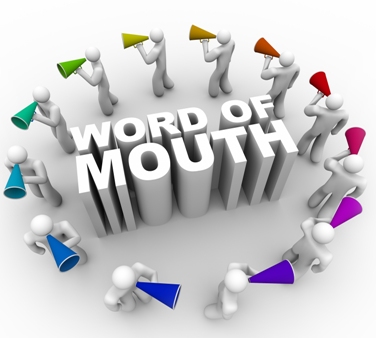Word-of-Mouth Marketing in the Digital Age
 The advancement of technology that leads to the emergence of social media in today’s digital age has changed the way consumers receive marketing messages and perceive advertising. The whole process of buying a product has changed, and traditional advertising has begun to lose its meaning and influence.
The advancement of technology that leads to the emergence of social media in today’s digital age has changed the way consumers receive marketing messages and perceive advertising. The whole process of buying a product has changed, and traditional advertising has begun to lose its meaning and influence.
To some extent, Paid Media – television and radio advertising, print ads, and billboards – can still affect the consumers although they are no longer as influential as in the past. People are flooded with so many advertisements and promotions from so many brands that consumers begin to ignore the benefits of the products advertised.
Word-of-mouth marketing is the oldest, simplest and often most effective medium of advertising. Long before billboards, radio ads or newspaper ads were created, people shared their opinions about products and services in conversations. Today with the development of the online community formed on social networking sites, word-of-mouth marketing becomes something crucial.
Word-of-Mouth and Social Media
Promotion of products to consumers is no longer confined to a single conversation. With the outbreak of social media, blogs, and online testimonials, now people can pour their minds out and instantly reach thousands of people at once. Digital Word-of-mouth is a kind of social media marketing. Companies must understand the strengths that the consumers have in social networks and their influence on one another to increase the purchase of goods and services. Consumers are likely to trust the suggestions and opinions of their peers more than the ads created by the company about the quality of a product. Consumers talk about the products they like when they believe in the high quality of the product and they feel the need to share their satisfaction with others.
Usually, consumers want to do some research before making a purchase, especially if the product is fairly new or high-priced. The research conducted usually comprises searching for other consumers’ opinions and checking the online reviews of the product. These two forms of product research are examples of word-of-mouth marketing in which a person tells other people about the goods or services they are selling.
Some companies realize the marketing potential of social media, but they make mistakes by hiring people to make positive product reviews and post them online. While they may be able to go ahead with it, usually the end result is not organic and can risk tarnishing the business reputation. Potential customers will certainly trust their fellow consumers better and become skeptical of self-promoting business, and if they learn that they cannot sincerely trust online testimonials, the company and its products will lose the consumers’ trust. One of the most important things to do in business is trying to generate a positive digital word-of-mouth marketing in order to create a successful Facebook page. Every time a consumer likes the company’s page, it will automatically generate product and service approval from members of the online community.
Engaging consumers on Facebook social networking is also an effective way to get people to talk and spread the word about the company. Businesses can also attract consumers by holding events or contests and designing interactive activities such as online games that involve consumers.
Companies still need to spend millions of dollars each year on traditional advertising that can help to achieve goals and influence consumers. However, the word-of-mouth digital marketing will become more and more important in the eyes of the business and the advertising team that the company hires. It will be very effective, authentic, and beneficial to drive consumers to purchase the products from the company.
source:
socialmediatoday



